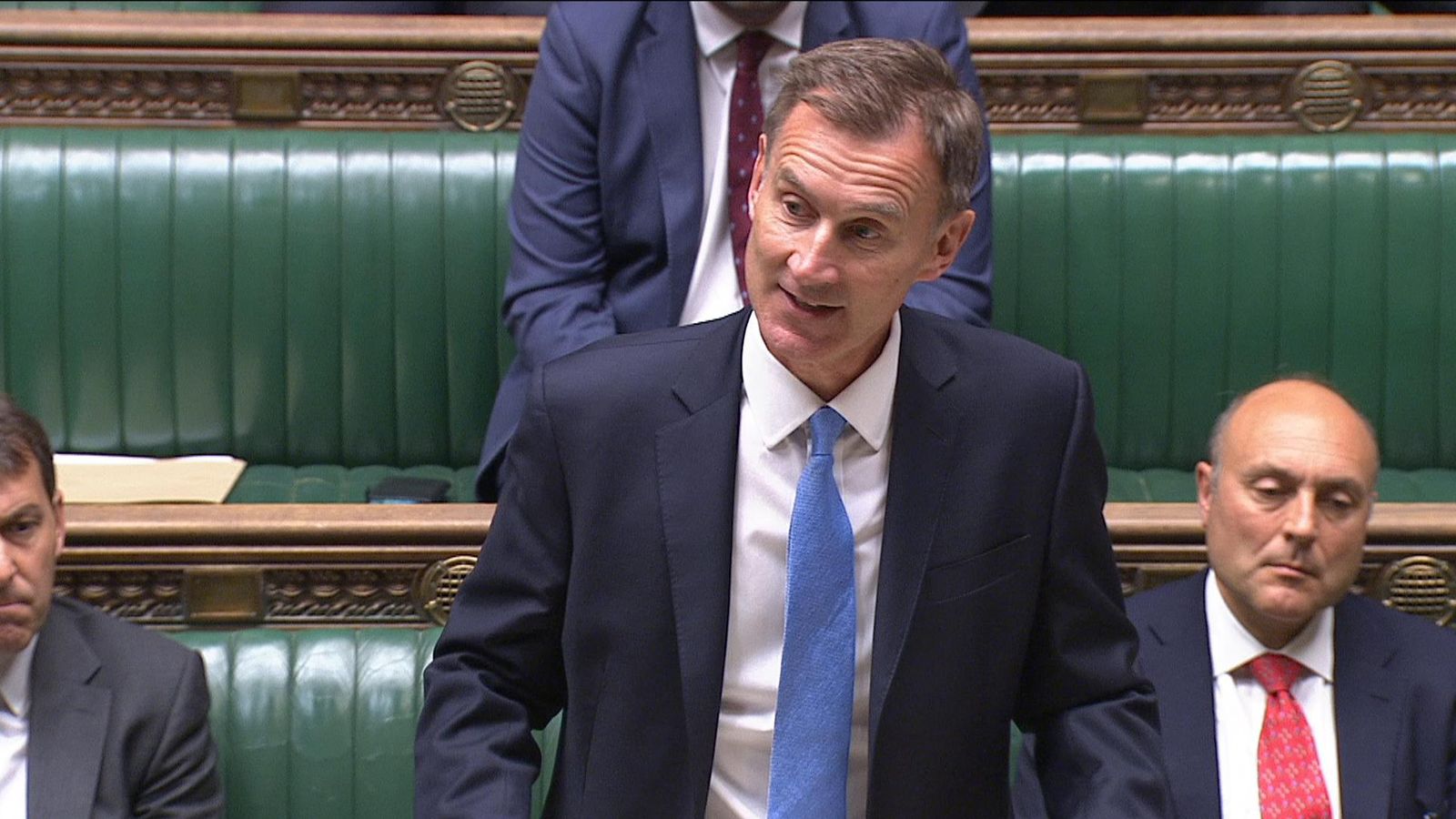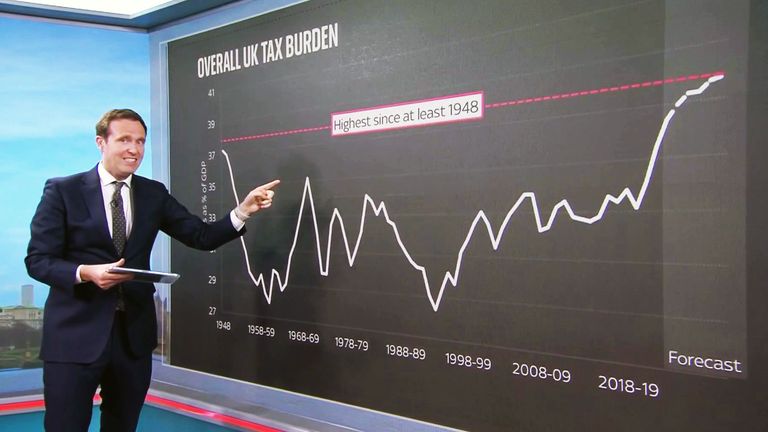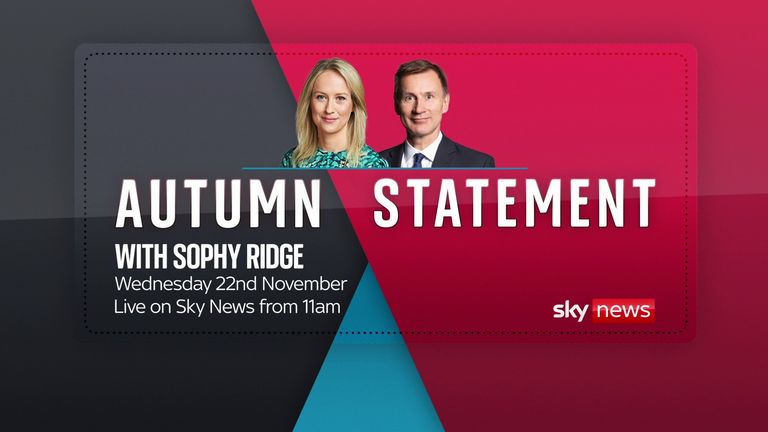Autumn statement: Chancellor Jeremy Hunt to claim economy is ‘back on track’


Jeremy Hunt will claim the economy is “back on track” in an autumn statement that is expected to prioritise tax cuts and economic growth.
The chancellor is expected to say the government’s plan for the economy is “working” but “the work is not done” as he unveils measures to boost business investment by £20bn a year, cut tax and get more people into work.
Mr Hunt will also set out decisions to grow the economy, reduce debt and return inflation to the Bank of England target of 2% – building further on Mr Sunak’s pledge to halve inflation by the end of the year.
Politics latest: Tories ‘running out of time’ – so expect tax cuts
After keeping coy about the prospect of tax cuts, they now appear to be firmly on the table as Mr Hunt vows to “reject big government, high spending and high tax because we know that leads to less growth, not more”.
But Labour’s shadow chancellor Rachel Reeves claimed the Tories were the party of “high tax”, adding: “Nothing the chancellor says or does in his autumn statement can change their appalling record.”
The hint of tax cuts comes after a Sky News poll of polls put the Tories 20 points behind Labour,
This is a worse margin than where Rishi Sunak was at the start of the autumn, when the Conservatives were an average of 18 points behind.
National insurance expected to be cut and national living wage increased
Advertisement
Among the key measures expected to be announced is a possible cut to national insurance contributions.
The government is also hoping to incentivise work by shaking up the welfare system and increasing the national living wage, which will rise from £10.42 to £11.44 from April and will benefit workers aged 21 and over, rather than 23 and over.
It will mean an £1,800 annual pay rise next year for a full-time worker on the living wage, while 18 to 20-year-olds will receive a £1.11 hourly rise to £8.60.
Mr Hunt is expected to say in his statement: “After a global pandemic and energy crisis, we have taken difficult decisions to put our economy back on track.
“We have supported families with rising bills, cut borrowing and halved inflation.
“The economy has grown. Real incomes have risen.
“Our plan for the British economy is working. But the work is not done.
“Conservatives know that a dynamic economy depends less on the decisions and diktats of ministers than on the energy and enterprise of the British people.”
Please use Chrome browser for a more accessible video player
2:07
Are tax cuts on the horizon?
In total, the chancellor is expected to announce 110 different growth measures for businesses, including plans to cut tax, remove planning red tape and speed up access to the national grid.
Meanwhile, there will also be support for entrepreneurs to raise capital policies to unlock foreign direct investment and to boost productivity.
“Taken together we will increase business investment in the UK economy by around £20bn a year over the next decade and get Britain growing,” Mr Hunt will say.

The chancellor is expected to take advantage of headroom in the public finances – created as a result of higher wages and the freeze in income tax thresholds – to reduce taxes while also sticking to his fiscal rules.
They dictate that the government should have debt falling in the fifth year of the economic forecast and that borrowing should be less than 3% of gross domestic product (GDP).
In an interview with Sky News, former home secretary Dame Priti Patel expressed her desire to see tax cuts.
“This government has got the highest tax take in 70 years,” she said.
“I am an absolute advocate of making sure that hard-pressed taxpayers can keep more of their money. And you know, that is through tax cuts.
“And there are ways in which that can be achieved through targeted tax cuts, such as addressing the conundrum of fiscal drag where so many more people get dragged into the higher tax.”
Read more:
Autumn statement unlikely to put big dent in tax burden – here’s why
Fiscal headroom and thresholds – what key autumn statement terms mean
A look at the polls might explain Tories’ new zeal for tax cuts | Beth Rigby
Mr Hunt will also pledge to “reform welfare” in the autumn statement after already confirming a £2.5bn Back to Work plan, which aims to bring 1.1 million people back in the workforce.
Measures in the plan including removing benefits such as free prescriptions and legal aid from job seekers who are judged not to be looking for work.
Ms Reeves said: “After 13 years of economic failure under the Conservatives, working people are worse off.
“Prices are still rising in the shops, energy bills are up and mortgage payments are higher after the Conservatives crashed the economy.
“The 25 Tory tax rises since 2019 are the clearest sign of economic failure, with households paying £4,000 more in tax each year than they did in 2010.
“The Conservatives have become the party of high tax because they are the party of low growth. Nothing the chancellor says or does in his autumn statement can change their appalling record.”